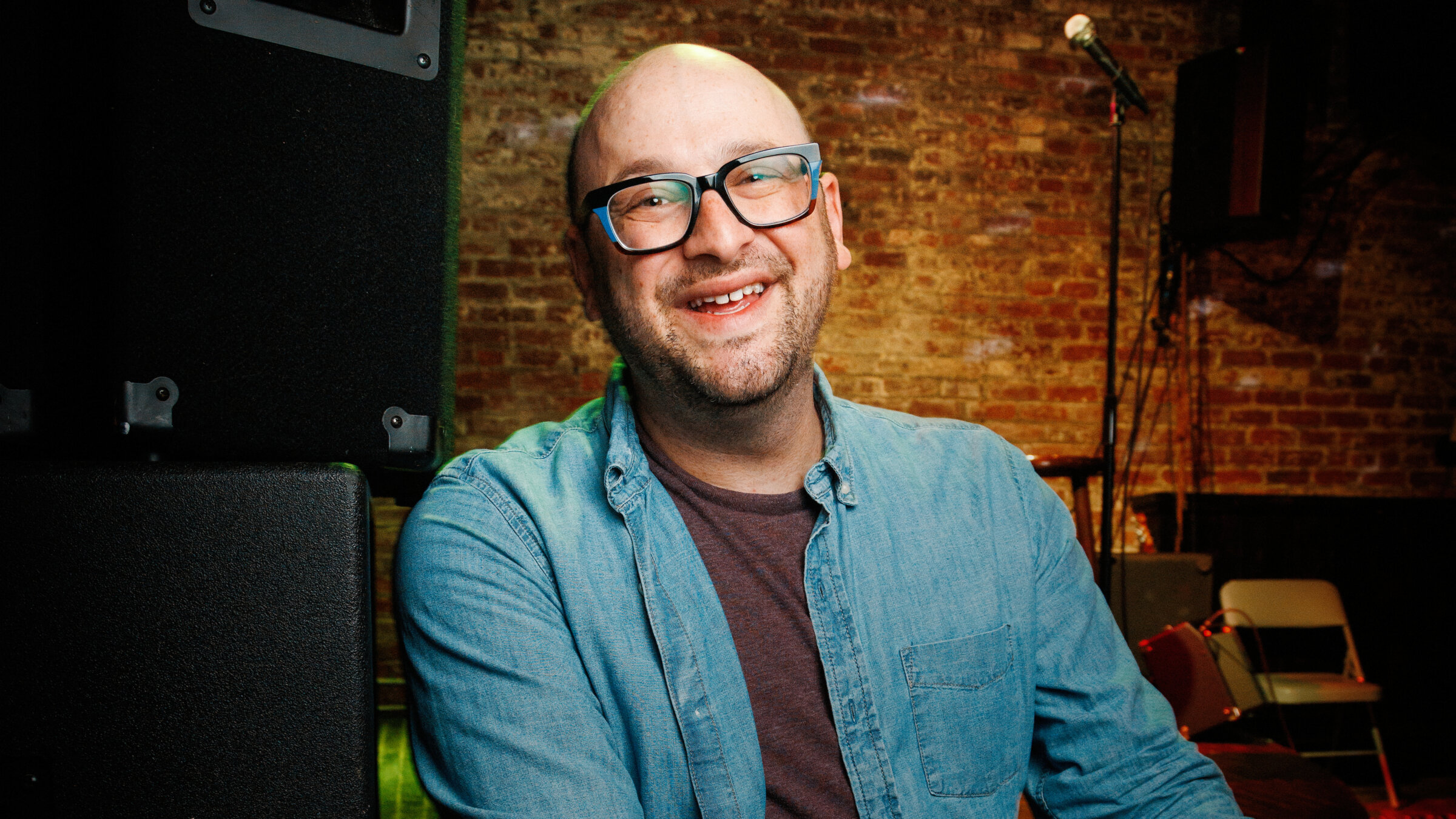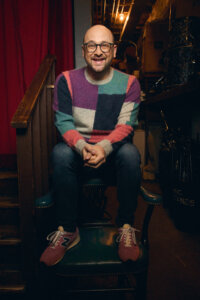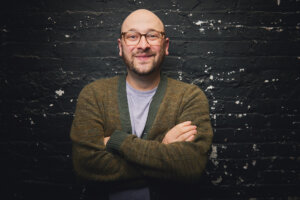Comedian Josh Gondelman is hilarious, but not disgusting
In his comedy special ‘Positive Reinforcement,’ Gondelman tackles aging, novelty baked goods and antisemitism.

Photo by Mindy Tucker
For a man who came of age at the turn of the century, comedian Josh Gondelman is holding up well. He has all his teeth. Mentally as well as physically, he is vigorous. He is capable of standing and telling jokes to a cackling crowd for hours under bright light. He has brought youthful vigor and stamina as a writer on such projects such as The Marvelous Mrs. Maisel and Last Week Tonight with John Oliver, for which he won four Emmy Awards, two Peabody Awards, and three WGA Awards. In his spare time, he preserves mental plasticity by learning to maneuver on Tiktok, where he has picked up terms such as “praise kink” and “fam.”
Now, back in New York after a two-year stand-up tour that took him across the country (and Toronto), Gondelman is releasing a new comedy special, Positive Reinforcement, which aired on YouTube on June 27. In it, Gondelman reminisces about the golden fin-de-siècle days of his youth (“Limp Bizkit was atop the Billboard charts”), but also looks to the future. He discusses developments he approves of: gender neutral pronouns, widespread acceptance of the concept of “mental health,” and a novelty baked good sold near his house in Boerum Hill known as the “everything cruffin.” The developments he disapproves of? Only one: rising antisemitism.
Gondelman is bright-eyed and sweet-faced. Despite his glasses and his stubble, he looks like a Jewish cherub. His earnestness is refreshing even through a smudgy computer screen; last fall, I spent a lot of time watching stand-up open mics in Boston and came away with the impression that to be an authentic stand-up comedian, I should probably strut around and shout “PUSSY!!” whenever the spirit moved me. Gondelman, who is hilarious but not disgusting, dispelled that notion.

“I try not to be disgusting,” he confided in me when we met for coffee at Café Kitsuné in Boerum Hill (which does not sell “everything cruffins” — I checked). “There are lots of really funny comedians who are also kind of disgusting in what they say. But what you’re seeing are people who don’t yet have the skills to be both disgusting and funny. You can be disgusting without a lot of practice!” That was an encouraging idea. Could I be disgusting right now? “Right from the hip!” Gondelman assured me.
It was a hot day to be sitting at a curbside table; I squirted some sunscreen into my palm in a disgusting, not hilarious way. I offered Gondelman some. He accepted. We smeared the goop onto our Ashkenazi pallor.
Gondelman first tried out stand-up when he was 19, in the summer between his freshman and sophomore years of college. His friend Joe, who is now “a very funny lawyer,” was experimenting with stand-up himself. Gondelman remained an audience member until another friend, Dan, “who doesn’t really mince words,” gave Gondelman a metaphorical slap on the hindquarters: “He said, ‘Well, you’ve always wanted to do this, and Joe’s doing it… Get with it! Get on the stick!’”
He got on the stick.
But orienting himself on the comedy scene took time. “I think comedy is a learned skill more than an innate talent,” he told me. “When I started, I was very tentative onstage, and I didn’t have super compelling thoughts to share.” As Gondelman finished up his double-degree in English and creative writing at Brandeis and worked as a preschool teacher in Arlington, Mass., he began to develop the “ear-to-the-ground nature for examining my own life” that allowed him to X-ray the everyday and find the comedic skeleton underneath.

“I think so much of comedy is just about the noticing,” Gondelman said. “There are so many topics that are really serious, but when you’re close to them, you can see the kind of absurdity.”
Though his comedy mostly glides above the surface of the serious, it does contend with life’s more painful elements — politics, antisemitism, the death of childhood companions — before swooping up again to take a breath and laugh.
Antisemitism, he told me, is “a tricky thing to approach with humor because I think people have really different feelings on what constitutes antisemitism.”
“I think our federal government, and lots of smaller institutions, too, are using the spectre of antisemitism — which exists and is scary — to crack down on free speech and other kinds of political dissent.”
But Gondelman isn’t ready to despair. There are good things in this world, he reminded me, and human connection — the sort Gondelman fosters with his audiences — is at the top of the list.
“I talk a lot about just being a person in the world,” he told me. “I really want to extend my hand to be like, ‘Come on, we’re doing this together,’ rather than, ‘All right, IDIOTS! Here I am in your STUPID CITY!’ That’s not my attitude at all. If I go to a place, it’s because I want to be there and I want to talk to the people that are there.”
All too soon, my time with Gondelman was up. It was disappointing to see him go, a bit like watching the sun slink behind clouds. I watched him round the corner and disappear from sight. Wherever he was going, I hoped they had everything cruffins.
















